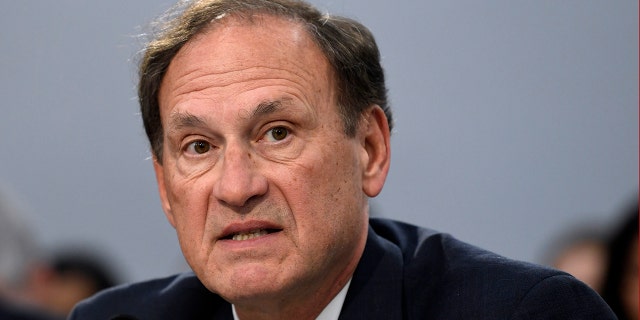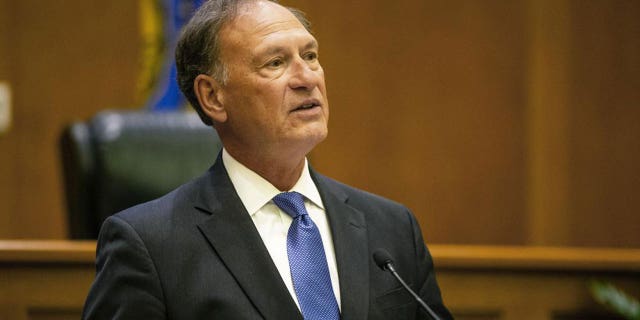Fox News Flash top headlines for October 1
Fox News Flash top headlines are here. Check out what’s clicking on Foxnews.com.
Justice Samuel Alito pushed back Thursday against criticism, including some from colleagues, that recent Supreme Court actions in major cases have been done hastily and in the shadows. “A dangerous cabal” improperly deciding important matters — hardly, he said.
Alito, in remarks at the University of Notre Dame, took aim at critics of three recent decisions in which the court’s conservatives prevailed over dissents by liberals.
In rapid succession beginning in late August, the court reinstated a Trump-era immigration program, allowed evictions that had been paused by the coronavirus pandemic to resume and let a Texas law severely limiting abortion go into effect.
In this March 7, 2019, file photo, Supreme Court Justice Samuel Alito testifies before House Appropriations Committee on Capitol Hill in Washington. (AP Photo/Susan Walsh, File)
All three cases came to the court as emergency motions, and were decided quickly and without the court’s more typical full briefing and oral argument. That process has been called the court’s ” shadow docket.”
“Our decisions in these three emergency matters have been criticized by those who think we should have decided them the other way, and I have no trouble with fair criticism of the substance of those decisions,” Alito said.
He added: “My complaint concerns all the media and political talk about our sinister shadow docket. The truth of the matter is that there was nothing new or shadowy about the procedures we followed in those cases — it’s hard to see how we could handle most emergency matters any differently.”
Alito noted that it’s not up to the court but to the parties in cases when they bring emergency motions. He said the recent criticism has suggested that “a dangerous cabal is deciding important issues in a novel, secretive, improper way in the middle of the night, hidden from public view, without waiting for the lower courts to consider the issues.”
Alito said that “picture is very sinister and threatening, but it is also very misleading.”
The string of recent emergency decisions began with a 6-3 vote to reinstate a Trump administration program that forces people to wait in Mexico while seeking asylum in the United States. A majority of the court said the Biden administration likely violated federal law in trying to end the program.
Supreme Court Justice Samuel Alito addresses the audience during the "The Emergency Docket" lecture Thursday, Sept. 30, 2021, in the McCartan Courtroom at the University of Notre Dame Law School in South Bend, Indiana. (Michael Caterina /South Bend Tribune via AP)
(Michael Caterina /South Bend Tribune via AP)
Days later, the justices, again on a 6-3 vote, blocked the Biden administration from enforcing a temporary ban on evictions that was put in place because of the coronavirus pandemic.
Most recently, the high court on a 5-4 vote declined to block a Texas law that has resulted in a near-total ban on abortion in the state. The unsigned majority opinion in that case was issued around midnight and was not even two full pages. Unlike the previous two emergency cases, Chief Justice John Roberts joined his liberal colleagues.
Alito said it was “false and inflammatory” for critics to claim that the conservatives in the Texas case effectively nullified the landmark Roe v. Wade decision guaranteeing a woman’s right to an abortion. Critics have said that by letting the law take effect, the court has allowed the state to sharply curtail abortions in the nation’s second-largest state.
It was also in that decision that Alito’s colleague, Justice Elena Kagan, said the majority’s ruling “illustrates just how far the Court’s ‘shadow-docket’ decisions may depart from the usual principles of appellate process.”
The majority made a significant ruling without any guidance from an appeals court and then after reviewing “only the most cursory party submissions, and then only hastily,” Kagan wrote. She accused her colleagues of barely bothering to explain their conclusion.
“In all these ways, the majority’s decision is emblematic of too much of this Court’s shadow docket decision-making — which every day becomes more unreasoned, inconsistent, and impossible to defend,” she said.
Roberts also criticized the case’s path to the court, saying the justices were asked to “resolve these novel questions — at least preliminarily — in the first instance, in the course of two days” without oral argument, additional briefs and guidance from lower courts.
Alito went through and rejected 10 different criticisms of the court’s emergency practices, from the argument that emergency orders are “secretive” to the fact that they aren’t typically signed by the justice who wrote them.
Alito acknowledged there have been more emergency motions in recent years but he attributed that to an influx of civil cases brought about by President Donald Trump’s initiatives, as well as issues sparked by the coronavirus, including those relating to prisons and religious freedom.
Alito said he wasn’t suggesting “that our current practice is perfect and that possible changes should not be considered.” But he said that the recent portrayal of the court “feeds unprecedented efforts to intimidate the court or damage it as an independent institution.”
Alito’s speech came just days before the justices’ planned return to their courtroom for oral arguments, more than a year and a half after the in-person sessions were halted because of the coronavirus pandemic. The justices had been hearing cases by phone during the pandemic but are currently on their summer break.
Justice Clarence Thomas also recently spoke at Notre Dame, where Justice Amy Coney Barrett attended law school and taught for many years.
Source: Read Full Article



